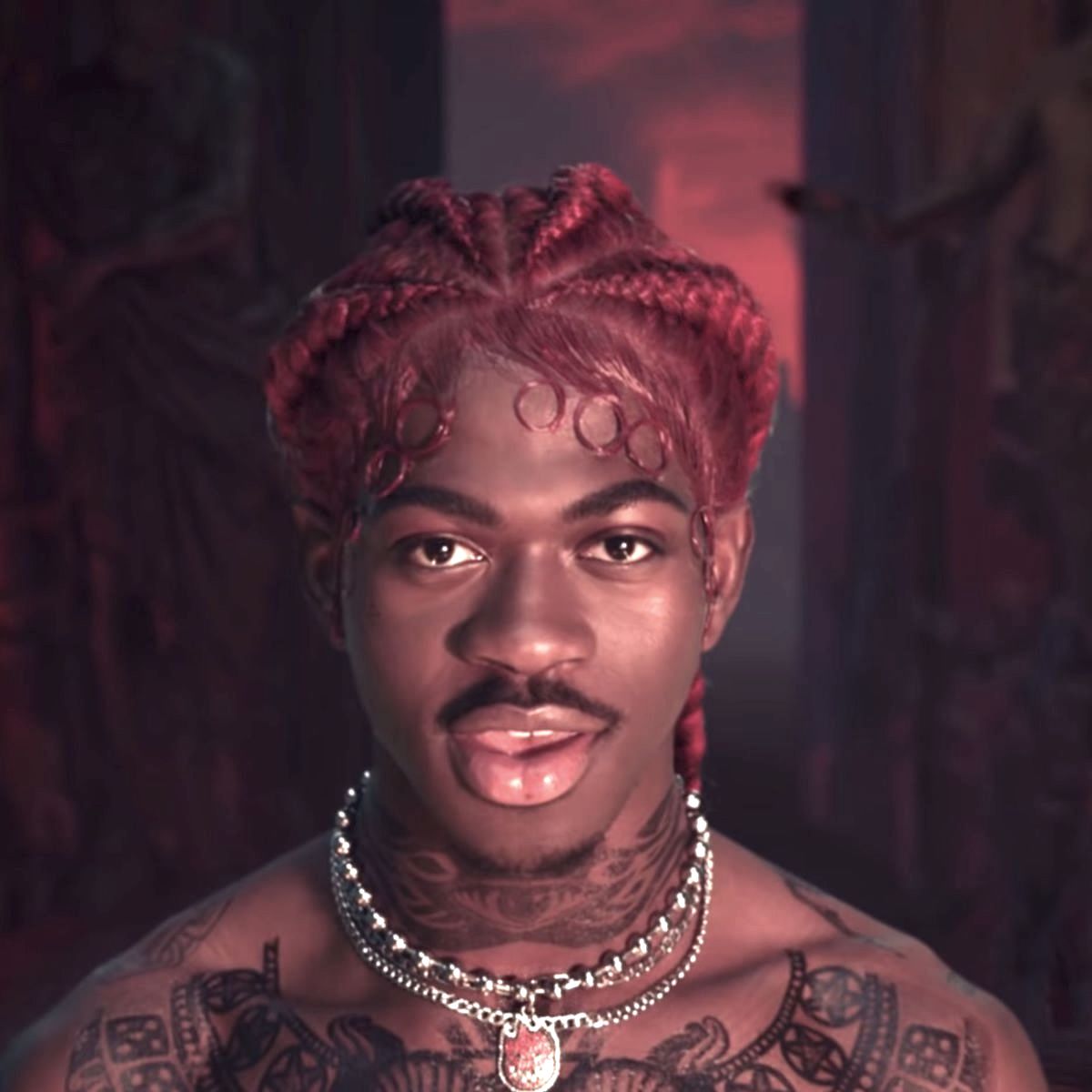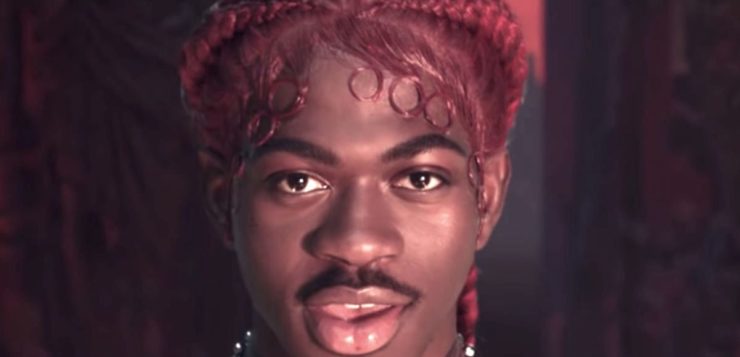MONTERO
(Call Me By Your Name)
Song by Lil Nas X
Columbia Records
IT’S A SIN
Created by Russell T. Davies
HBO
TWO ARTIFACTS of LGBT popular culture in 2021 feel like déjà vu all over again, particularly evoking the zeitgeist of the 1980s. Each in its way has been a stake through the hypocritical heart of America’s religious Right.
First, the American rapper Lil Nas X dropped his single “Montero” and created (as intended) a firestorm. Subtitled “Call Me by Your Name,” an allusion to the gay novel by André Aciman [discussed, coincidentally, in this issue], “Montero” reached its target audience like a heat-seeking missile. Fox News pundits claimed that Lil Nas X had deliberately timed the song’s music video as an assault on the Holy Week and the days leading up to Easter Sunday. An additional source of moral panic was a customized pair of Nike sneakers, the so-called “Satan shoes,” said to contain a drop of human blood. South Dakota governor Kristi Noem evoked not just a holy week but a holy war, tweeting that “we are in a fight for the soul of our nation.” Initially, Lil Nas X responded with little more than a shoulder-shrug—“ur a whole governor and ur on here tweeting about some damn shoes. do ur job!”—before evoking his own personal history as a Black gay boy who grew up in Georgia: “I spent my entire teenage years hating myself because of the shit y’all preached would happen to me because i was gay.” He went on, proving that one needn’t write in ALL CAPS to convey outrage: “So i hope u are mad, stay mad, feel the same anger you teach us to have toward ourselves.”

Needless to say, yesterday’s tweet is less important than the art that lasts, and the 22-year-old Grammy winner—born Montero Lamar Hill in 1999—has considerable staying power. A flashy mélange of camp and pop fantasia, “Montero” recalls the provocateurs who ruled the airwaves in the late 1980s, above all Madonna, whose “Like A Prayer” video (1989) featured burning crosses and a Black priest who cries blood. “If Eve ain’t in your garden,” he sings, “you know you can call me when you want” and “call me by your name.” Dressed in a Marie Antoinette-style wig and fur shawl, Lil Nas X plucks a pink guitar in the garden of Eden before beginning a delighted descent into the underworld (on a stripper’s pole, no less) only to give Satan himself a lap dance. Abandon all shame ye who enter here.
The second stake was the HBO series It’s a Sin, set in England in the 1980s at the height of the AIDS epidemic. It depicts a close, multiracial circle of friends whose ringleader is named Ritchie Tozer, played by Olly Alexander, who’s the lead singer of the band Years & Years. Stuffing his porno mags in a suitcase, Ritchie flees the Isle of

Wight to pursue an acting career in London. It’s a Sin was a smash hit in England: it debuted just as Brits returned to yet another Covid-19 lockdown, looking for a new show to binge on. And binge they did: 6.5 million streams in just over one week.
The drama’s creator is Russell T. Davies (Doctor Who, Cucumber), and it represents a return to the daring hedonism of Queer as Folk. Olly Alexander told Out that he was “scandalized” after seeing Queer as Folk at the age of fourteen. In the pilot for It’s a Sin, which opens in 1981, Ritchie happily competes in a sexual marathon: one-on-ones, threesomes, orgies, you name it. One of his earliest tricks, Ash Mukherjee, rightly calls him a “sex machine,” and Ritchie’s status as such is cemented by a staccato of sex scenes set to Bizet’s “March of the Toreadors.” Neil Patrick Harris and Stephen Fry make cameos, but the cast is otherwise comprised of a mostly young ensemble of newcomers.
“I just want to be happy,” Ritchie proclaims at the pilot’s ending. Yet the specter of AIDS, at first only rumored about by Ash and his lovable friend Colin, is a looming threat to Ritchie’s hoped-for happiness. The sober voice of reason belongs to Jill Baxter, who warns him: “Don’t you ever think you should stop [having]sex?” Unaware of the irony, he shoots back: “The thought police got you! You are infected!” In a sequence overflowing with energy, Ritchie breaks the fourth wall while weaving through a gay bar. “What about bisex- uals? Do they only get sick every other day?” he asks, “How is a cancer gay? Is it pink?” He then mocks the various theories that were circulating as to the source of this new plague, everything from poppers and God’s vengeance to the Russians and a single gay flight attendant.
Even though It’s a Sin proceeds chronologically (from 1981 to 1991), the final episode comes full circle and ends where the series begins: in Ritchie’s boyhood bedroom on the Isle of Wight. As Mrs. Tozer, actress Keeley Hawes gives a devastating performance as a mother in lifelong denial about her son’s sexuality. The final scenes belong to her and to Lydia West as Jill, who argue bitterly over who is to blame for Ritchie’s life being so cruelly cut short. Jill points her finger at Ritchie’s mum, arguing that it was homophobia that made her best friend sick. “He was ashamed,” she says acidly, “He kept the shame going … that’s what shame does, Valerie.” More arresting is the confessional that Ritchie himself delivers from his deathbed, telling his mother that he doesn’t regret any of the sexual escapades that led to his infection. Fiercely unashamed, he takes pride in his countless conquests, which he describes in graphic detail to a mother who sits at his bedside. Seeing an old flame six years after the fact, Ritchie recalls his joy in seeing other gay men happy: “He looks happy and he’s with someone, and I think, ‘Ah, that’s nice.’ That it was so much fun.”
Even if homosexuality is considered a “sin” by some, Ritchie insists to his dying day that it was worth every last second. Lil Nas X’s “Montero” expresses a similar sentiment, albeit in a very different format, when the rapper refuses to apologize, saying: “I’m not phased [sic], only here to sin.”
Colin Carman, Ph.D., is the author of The Radical Ecology of the Shelleys.






